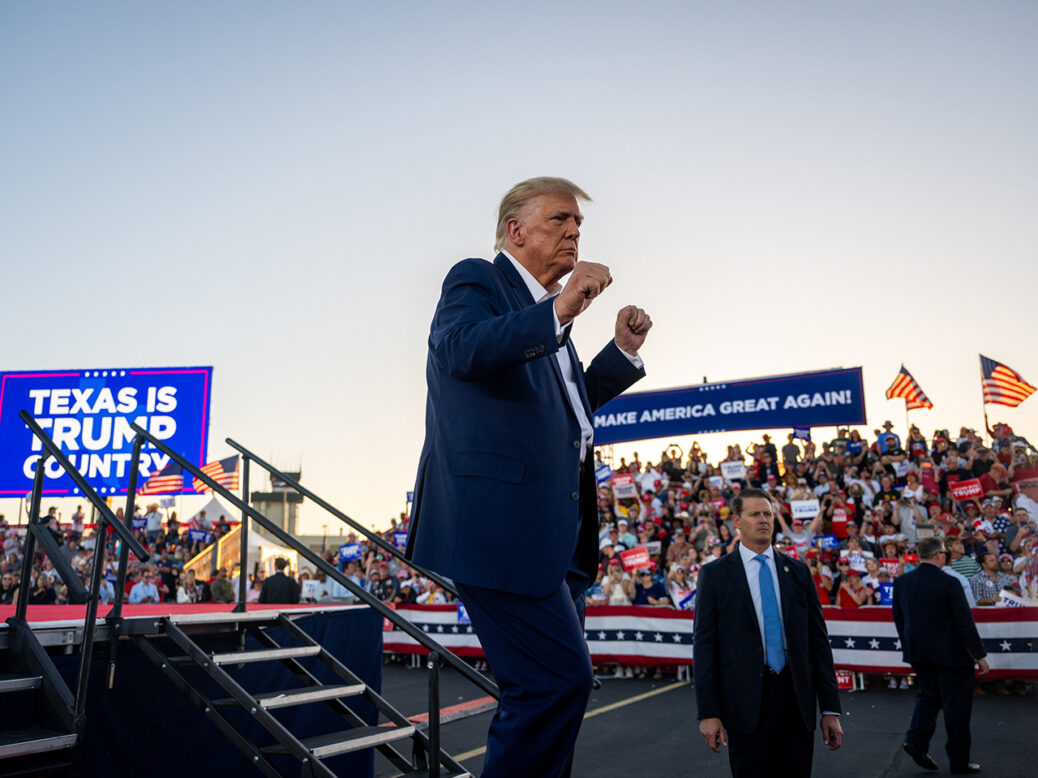
The crowd that gathered in Waco, Texas on Saturday for Donald Trump‘s first major rally of his 2024 presidential campaign experienced all the hallmarks of a classic Trump performance. There was the demonisation of opponents and enemies (the Florida governor Ron DeSantis, and Trump’s biggest rival for the Republican nomination, was disloyal and “dropping like a rock” in polls; prosecutors investigating him were “absolute human scum”). There was the bizarre boasting (he recalled taking a “pretty tough” cognitive test when he was in the White House, which he “aced”). And there was unrepentant sexism (he referred to Stormy Daniels, the adult actress who he is accused of paying off after an alleged affair, as “horse face”).
There were, however, also some new notes to Trump’s performance. The rally’s location has been widely interpreted as a signal to his base: the Texan city of Waco was the setting, 30 years prior, of a deadly siege and weeks-long stand-off between law enforcement and members of the apocalyptic religious cult, the Branch Davidians. More than 80 members of the cult died, as well as four US federal agents. The siege was described by AP as “a touchstone for far-right extremists and militia groups”. Team Trump claimed that the location was merely chosen for its proximity to other major Texan cities, the enthusiasm of its residents and its infrastructure.
But the setting wasn’t the only nod to fervent religious belief.
Robert Jeffress, one of the most influential evangelical leaders in the US, opened the rally for Trump, praising the former president and then leading the crowd in Waco in a group prayer. There was also a woman painting a large canvas onstage. This might seem an odd political gimmick, but some have suggested it is pulled straight from protestant church settings.
Trump himself leaned into fire-and-brimstone rhetoric, framing next year’s election as “the final battle”, which in biblical terms is the battle of Armageddon. He spoke of the “demonic forces” threatening the country. Even Trump’s repeated boasts throughout his speech – “I am your warrior, I am your justice… I am your retribution” – carried a distinct biblical allusion (the recurrence of “I am” in the New Testament), as well as an implicit nod to divine judgement.
Though Trump has long courted a white Christian base, this is relatively new material for the former president. Some elements made an appearance during a speech made at the conservative political conference known as CPAC earlier in March. It appears the deeply apocalyptic, religious-adjacent performance will become a feature of Trump’s third campaign for the White House.
It’s not clear what effect this will have on evangelicals and other white Christian groups. After all, Trump has repeatedly proved himself an odd, flawed choice for the deeply religious. Particularly since Trump railed against Republican midterm candidates who he said made too much of the “abortion issue” then lost. (Though Trump is still the leading Republican candidate in polls, among the party’s evangelicals specifically, DeSantis is the preferred candidate.) But it’s likely they aren’t Trump’s only target audience anyway. Though this development in campaign rhetoric has the trappings of fervent Christian belief, its dark paranoia skews closer to the conspiracy theories of QAnon – a group that has, so far, shown it is more than willing to make Trump its messiah.
This article first appeared in the World Review newsletter. It comes out every Monday; subscribe here.
[See also: Trump’s indictment is a gift to Ron DeSantis]





